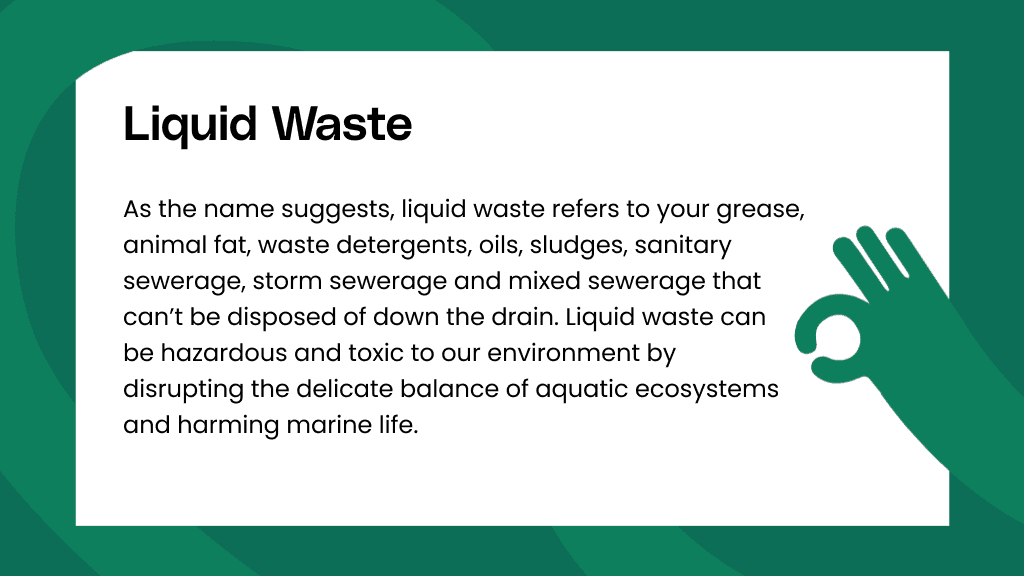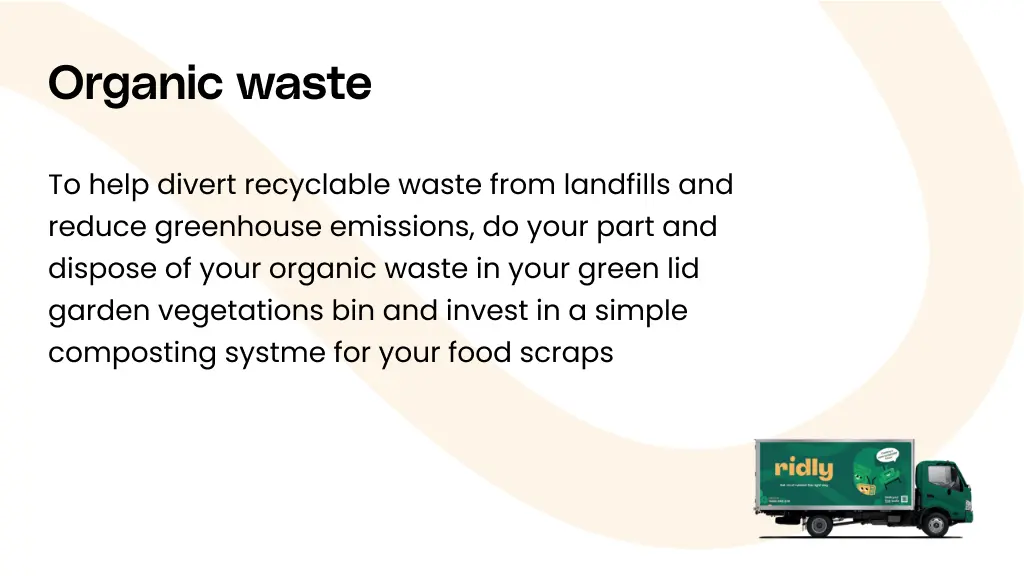
We’re all guilty of disposing of our recyclables and food waste in the general bin. Rubbish is rubbish, right? Wrong. In fact, there are multiple different types of garbage, and it’s becoming increasingly paramount that we recognise each category so that we can dispose of our household, commercial and industrial rubbish properly for a cleaner, healthier environment.
So, how many types of waste are there? In this article, we’ll break down the five different types of waste, liquid waste, solid waste, organic waste, recyclable waste, and hazardous waste, answering any questions you might have when it to the various kinds of rubbish.
The Five Types of Waste
How many types of waste are there? Helpful information can be hard to come by, so we’ve compiled a comprehensive guide to the five types of rubbish.
1. Liquid Waste
As the name suggests, liquid waste refers to your grease, animal fat, waste detergents, oils, sludges, sanitary sewerage, storm sewerage and mixed sewerage that cannot be disposed of down the drain. Liquid waste can be hazardous and toxic to our environment by disrupting the delicate balance of aquatic ecosystems and harming marine life. Further, it can penetrate the soil, killing plants and destroying natural habitats, ultimately leading to biodiversity loss. Liquid waste can pose severe threats to human health and make people severely ill when fluids leak and contaminate waterways.

If that isn’t enough to deter you from disposing of liquid waste incorrectly, the offensive smell might. Particularly when industrial and commercial locations do not dispose of liquid waste properly, it can leave the disposal site with a potent stench. This may not harm anyone directly, but you will likely receive some complaints.
So, how should liquid waste be disposed of? There are three standard disposal processes:
- Incineration: Incinerating liquid waste is one of the more common disposal methods, ideal for hazardous materials including acids, chemicals and oils. However, incinerators use a considerable amount of energy and releases toxins and greenhouse gases into the atmosphere, making it a harsh method of disposal on the environment.
- Dewatering: Dewatering is suitable for nonhazardous materials. Liquid waste is pumped into a durable bag to separate the water from the waste. The water then can be treated and filtered, and the remaining solid waste can be disposed of in landfills.
- Composting: Certain facilities can create compost from non-hazardous liquid waste by removing the water from the waste, retrieving the nutrients left behind. Composting is the best option for the environment and is relatively inexpensive.
Liquid waste requires careful handling and strictly regulated disposal methods to prevent harm to the environment. Ridly offers a comprehensive liquid waste removal service in compliance with state regulations. Let us take away the burden of liquid waste today!
Give us a call on 0491 181 130 for all your household and commercial waste removal needs.
2. Solid Waste
Solid waste refers to various waste found in households, industrial and commercial settings. To expand your solid waste knowledge, let’s break down the four main categories of solid waste:
- Glass and Ceramics: Consists of broken glass cups, ceramic plates
- Plastic Waste: Containers, bottles and bags made from plastic
- Tins and Metals: Metal cans
- Paper/ Card Waste: Newspapers, packaging materials, cardboards
Managing and disposing of your solid waste properly is crucial to ensuring environmental hygiene. Across Sydney and Australia, there are several resource recovery facilities where solid waste is composted, processed, and treated to protect the environment and convert materials back into new materials.
3. Organic Waste
Organic waste is biodegradable and can be found in most households across Australia and the world. Organic waste includes your food waste and garden organics that break down with micro-organisms and decompose with time. Organics are biodegradable, which can be easily disposed of by composting or conversion. Composting breaks down the waste until it becomes a nutrient-dense fertiliser. On the other hand, conversion creates a source of renewable energy from food waste.

It’s tempting to dispose of organics with your general waste, but burying organic waste in landfills is a significant problem for two key reasons:
- Firstly, because organic waste is biodegradable and can be composted into a soil conditioner to promote healthy soil, give your plants a nutrient boost and help retain their moisture levels.
- Secondly, due to a lack of oxygen, when organic waste is buried in landfills, it undergoes anaerobic decomposition. It’s a mouthful, we know. Essentially, it will generate methane, a more potent greenhouse gas than carbon dioxide and one of the most significant contributors to global warming.
To help divert recyclable waste from landfills and reduce greenhouse emissions, to your part and dispose of your organic waste in your green lid garden vegetation bin and invest in a simple composting system for your food scraps.
Examples of organic waste include:
- Paper
- Food scraps
- Coffee grounds, apple cores, eggshells and other kinds of food by-products
- Green waste such as garden trimmings, fallen leaves and pulled weeds
- Plants and cut flowers
- Livestock manure
- Cardboard packaging
4. Recyclable Waste
It’s no secret that recycling is the key to preventing the waste of valuable materials and keeping the wheels turning on an effective circular economy. When we recycle, we reduce the need for new materials, therefore reducing energy usage, air, and water pollution.
Recyclable waste refers to all materials that can be converted and repurposed into new products.
Examples of recyclable waste include:
- Papers- newspapers, magazines, and copy paper
- Cardboard
- Glass bottles and jars
- Milk and juice cartons
- Hard plastics- bottles and containers
- Steel- tin and aluminium cans, and empty aerosols
When recycling your commercial, industrial, or household items, there are three main rules to keep in mind:

- Recycle clean bottles, cans and paper items
- Keep your food scrapthree-main-rules-when-recycling.pngs, liquids, organic waste and hazardous waste out of your recycling bin
- Do not recycle loose plastic or bagged recyclables
Recycling your waste products properly can help to prevent useful items from being buried in landfills or contaminating our waterways and the ocean. Do your part, recycle effectively and efficiently to give everything in your yellow lidded bin a second life.
5. Hazardous Waste
When it comes to thedifferent types of waste, hazardous waste is likely the most daunting to dispose of, and understandably so. Hazardous waste includes flammable, toxic, corrosive, and reactive materials that can harm the community and the environment.
Examples of hazardous waste include:
- Asbestos
- Ammunition
- Chemicals- chlorine, pool and photo chemicals
- Batteries- household and automotive batteries
- Pesticides, herbicides, insecticides and weed killers
- Oil (automotive)
- Bleach, ammonia
- Paint and paint thinners
- Fluorescent tubes
- Electrical appliances

There are three key ways of disposing of hazardous waste safely and effectively:
- Recycling: While there are exceptions, a few hazardous wastes can be recycled and repurposed to create other products. For instance, paint can be mixed with different solvents and used in cement manufacturing; the raw materials like lithium, plastic and metals from mobile phones can be extracted and repurposed for new products, reducing the need for virgin materials and saving energy required to extract and process them. This is what is called a circular economy.
- Combustion, Incineration and Industrial Boilers: Hazardous waste can be incinerated to reduce the volume of waste, destroy toxic substances and in some cases, recover materials and generate energy.
- Pyrolysis: Pyrolysis involves the process of chemically decomposing hazardous waste in controlled, extreme temperatures, absent of oxygen. This process is ideal for hazardous organic waste, and pesticides.
For your everyday household hazardous waste items, such as batteries, mobile phones, and printer cartridges, search for your nearest drop off point or contact the Ridly team for safe electronic waste disposal Sydney and any other rubbish removal service.
Professional Removal Services for Different Rubbish Types
We all want to do our part to work towards a cleaner and healthier future. One of the best ways to be a part of positive change if you find yourself strapped for time for proper waste management is to enlist professional removal services.
At Ridly, we believe that understanding the answer to “How many types of waste are there?”, is the key to sustainable rubbish disposal. The Ridly team are dedicated to working towards a cleaner future through safe, responsible rubbish removal and disposal. So, when you engage our services, you can have complete confidence knowing that we do our part for the planet and contribute to a circular economy by diverting as much waste from landfills as we can. For example, your garden organics will be utilised to improve the fertility and nutrient richness of agricultural soils directly. Any raw materials extracted from hazardous waste items will be repurposed for new products.
Ridly are equipped to handle all your requirements for different types of rubbish, with a fleet of purpose-built vehicles designed to transport everything from organic waste to hazardous waste.
Are you interested in closing the gap between wanting to help the environment and actively doing so? Please get in touch with the Ridly team, and we will customise our solutions to meet your residential or commercial needs. Enquire online for a free quote or call us on 0491 181 130.